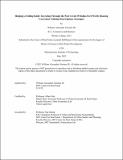Hedging a Falling Knife: Investing Through the Post Covid-19 Dallas-Fort Worth Housing Correction Utilizing Real Options Strategies
Author(s)
Gietema III, William Alexander
DownloadThesis PDF (15.58Mb)
Advisor
Saiz, Albert
Terms of use
Metadata
Show full item recordAbstract
Historically and in past housing cycles, the Dallas-Fort Worth (DFW) housing market has maintained remarkable price stability relative to the broader U.S. housing market. Consistent population and employment growth, combined with abundant developable land, have created the ideal environment for developers and homebuilders to achieve the stable production of new single-family housing. In the face of rapid population growth, the high elasticity of housing supply in DFW has enabled the region to maintain housing affordability relative to other major U.S. housing markets.
The Covid-19 pandemic was the second “once in a century” event to occur in the 21st century, the other being the 2008 Global Financial Crisis. Lock downs, work from home, low interest rates, and inflation characterized the supply and demand shocks that followed Covid-19 and produced a rapid escalation of home prices previously uncharacteristic to DFW fundamentals.
This thesis analyzes the impact and sustainability of Covid-19 supply and demand shocks on the DFW housing market and its participants. Focus is placed on the relationship between homebuilders, developers, and lenders in the event of housing correction due to rising interest rates and oversupply. Through the analysis of market fundamentals and structure and in the event of broader market decline, this thesis proposes an investment strategy based on the acquisition of distressed single-family lot developments. The investment strategy leverages real options theories of project delay and product switching to mitigate the risk of catching a falling knife.
Date issued
2023-06Department
Massachusetts Institute of Technology. Center for Real Estate. Program in Real Estate Development.Publisher
Massachusetts Institute of Technology